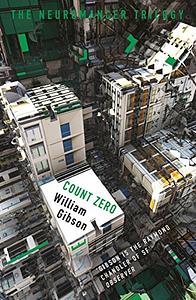You need to sign in or sign up before continuing.
Take a photo of a barcode or cover
A well crafted next step in a trilogy. Substantially different from the first book, but with a complimentary style and a differing, but equally interesting, look at the fascinating future Gibson has imagined.
adventurous
medium-paced
Plot or Character Driven:
A mix
Strong character development:
No
Loveable characters:
Complicated
Diverse cast of characters:
Yes
adventurous
challenging
dark
mysterious
tense
medium-paced
Plot or Character Driven:
Plot
Strong character development:
No
Loveable characters:
No
Diverse cast of characters:
No
Flaws of characters a main focus:
No
Overall Thoughts:
This was a fantastic follow-up to Neuromancer but I feel they have different strengths. Neuromancer had the stronger story, in my opinion, since it focused on one storyline as seen from the perspective of Case. Meanwhile Count Zero follows a different approach with three separate plot threads that gradually interweave and none of them individually were as compelling as Neuromancer, but together they present an equally satisfying book. Each storyline brings something different. Turner's story is more action-oriented while Marly's is more of a mystery. Bobby's story (the titular Count Zero) was the weaker one, and despite starting out strong he's on the sideline for much of the book.
This was a fantastic follow-up to Neuromancer but I feel they have different strengths. Neuromancer had the stronger story, in my opinion, since it focused on one storyline as seen from the perspective of Case. Meanwhile Count Zero follows a different approach with three separate plot threads that gradually interweave and none of them individually were as compelling as Neuromancer, but together they present an equally satisfying book. Each storyline brings something different. Turner's story is more action-oriented while Marly's is more of a mystery. Bobby's story (the titular Count Zero) was the weaker one, and despite starting out strong he's on the sideline for much of the book.
Likes:
- I liked the three plot threads between Turner, Bobby, and Marly, especially seeing how they all tied together.
- The characters were stronger and more developed in this story than Neuromancer because each has to carry their own storyline.
- The three plot threads brought stylistic changes between them which kept the story dynamic. You get a bit of everything between them.
- Gibson expands the lore in some significant ways that seem even more impactful than what already happened in Neuromancer.
- I felt like this was an easier read than Neuromancer but that might just be because I was already acclimated to the world and terminology after reading Burning Chrome and Neuromancer.
Dislikes:
- For being the titular character, Bobby's storyline was the least interesting by far and for most of it he is just along for the ride and not doing much despite the storyline starting strong.
- I didn't like the voodoo elements. While it makes sense subcultures would develop in cyberspace, this aspect seemed silly in what was otherwise a dark and gritty story and felt off in a similar way to the Rastafarians in Neuromancer.
- Similar to Neuromancer, I felt the story was weakest at its end. This time, it had a large amount of build-up between the three storylines but the resolution was more or less a deus ex machina and therefor fairly anticlimactic.
Other Notes:
- While this is a sequel to Neuromancer, it almost stands alone on its own. There's plenty of new stuff and it's set 7 years after Neuromancer and the prior book impacts the setting more than the plot. In a way it felt more connected to "New Rose Hotel" from the Burning Chrome short story collection than to Neuromancer.
- It was neat seeing Brussels appear in Marly's storyline having lived there.
Would Recommend To:
- Anyone interested in science fiction, especially the cyberpunk genre. I don't think it's necessary to have read Neuromancer first because the book reintroduces much of the plot of the first book in the setting, but it will help understand the world.
Do Not Recommend To:
- Anyone who doesn't like science fiction or the cyberpunk genre.
Nunca fui fã de trocas constantes de POVs e acho que isso foi um dos (muitos) motivos pra eu não ter gostado de Count Zero tanto quanto gostei de Neuromancer.
Mesmo contando três histórias ao mesmo tempo pareceu que nada aconteceu de fato e o enredo também não é tão interessante (até mesmo a escrita parece ter sofrido, com o autor colocando descrições excessivas e pensamentos aleatórios dos personagens a torto e a direito)
E o pior de tudo: os personagens. Eu não estava esperando que eles fossem super carismáticos nem nada, mas eu não consegui me importar com nenhum deles ou com o que estavam fazendo. Só fui arrastando a leitura porque eu queria muito ler Monalisa Overdrive e realmente espero que ele seja melhor do que esse
Mesmo contando três histórias ao mesmo tempo pareceu que nada aconteceu de fato e o enredo também não é tão interessante (até mesmo a escrita parece ter sofrido, com o autor colocando descrições excessivas e pensamentos aleatórios dos personagens a torto e a direito)
E o pior de tudo: os personagens. Eu não estava esperando que eles fossem super carismáticos nem nada, mas eu não consegui me importar com nenhum deles ou com o que estavam fazendo. Só fui arrastando a leitura porque eu queria muito ler Monalisa Overdrive e realmente espero que ele seja melhor do que esse
adventurous
dark
inspiring
mysterious
sad
tense
fast-paced
Plot or Character Driven:
Plot
Strong character development:
Yes
Loveable characters:
Yes
Diverse cast of characters:
Yes
Flaws of characters a main focus:
No
Count Zero is set in the Sprawl and happens several years after the events of the Neuromancer. We get several pov narratives as the megacorps and super-rich do their thing and the people on the edges try to survive. The corporations in this world are super organisations, almighty, and just about immortal - which all feels rather too real. Corporate espionage and gods in the wires, Cornell-like boxes and a girl who can access the matrix without jacking in.
I was happy to spot a nod to "The street finds its own uses for things” in here.
I was happy to spot a nod to "The street finds its own uses for things” in here.
adventurous
dark
mysterious
tense
fast-paced
Plot or Character Driven:
A mix
Strong character development:
Yes
Loveable characters:
Complicated
Diverse cast of characters:
Yes
Flaws of characters a main focus:
Complicated
adventurous
mysterious
medium-paced
I'm not sure I'm smart enough for this book (or this trilogy, actually). I don't always know what's going on but often feel as if I should. Maybe that's the author's fault but I'm more than willing to shoulder the blame here.
In any event, I enjoyed this. It's three separate stories that are woven into a single tale by the end. The world Gibson creates is just so fascinating that it almost doesn't matter what's happening in it, I just want to keep reading and learning more about it.
While other authors use multiple POVs (Tolkien comes immediately to mind with LOTR), the way Gibson does it here feels very similar to the way he does it in later novels, which isn't a surprise, really. But he'd already executed the technique at a pretty high level in just his second novel.
It's probably a good idea to have at least a passing knowledge of what happened in Neuromancer before reading this.
In any event, I enjoyed this. It's three separate stories that are woven into a single tale by the end. The world Gibson creates is just so fascinating that it almost doesn't matter what's happening in it, I just want to keep reading and learning more about it.
While other authors use multiple POVs (Tolkien comes immediately to mind with LOTR), the way Gibson does it here feels very similar to the way he does it in later novels, which isn't a surprise, really. But he'd already executed the technique at a pretty high level in just his second novel.
It's probably a good idea to have at least a passing knowledge of what happened in Neuromancer before reading this.
A bit disjointed, taking a long time to come together. Ending sneaks up on you and then is over.





